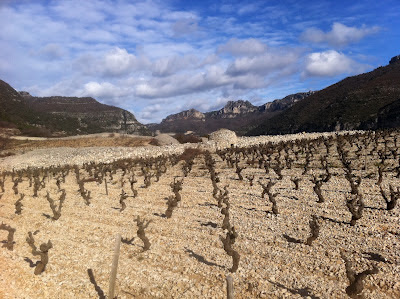Pas de l'Escalette

Pas de l’Escalette - Larzac
Languedoc, France
The road from the Loire to the Mediterranean heads past the hills of Larzac. Delphine Rousseau had seen the terraced fields in route to holiday destinations. Her husband Julien was working for Henri Pelle in Sancerre/Menetou-Salon, but the couple wanted their own place in the south, and needed to find the land. A friend called. He knew of a property for sale. After three years of struggling to convert eight hectares purchased from the local co-op to biodynamic farming, the previous owner was ready to quit.
“You can’t dive in like that with land that has been chemically farmed.” Delphine said. “You have to make the change slowly, give the land time to reach balance again.”
The couple now have 15 hectares in Larzac. They planted two abandoned hectares, bought three more and also rent some land (en fermage). The soil is clay-limestone; the vineyards have east-west sun exposure, which means they enjoy more shade over the course of the day. Pas de l’Escalette is on the coolest, top terrace of Larzac, with vines planted between 350-400 meters above sea level.
“Larzac is like a Gruyere.” Delphine explained. When it rains, water comes out of holes in the rocks everywhere.” Therefore Escalette’s vines have little hydric stress over the course of the year. In a region of desert-like windswept-and-stark landscapes, in summer this little corner of the Languedoc is quite green.
Delphine Rousseau is confident, direct, and engaging. She has a positive energy. At first I thought she’s maybe been enjoying a glass or two of wine, so rare is it to meet someone for the first time who smiles, maintains eye contact, is active and charismatic. But it is who she is. Julien Zernott is approachable, if quieter. He is big, a former professional rugby player in the French 2nd division, a nice guy with confidence about what he is doing that does not extend to arrogance. He frankly discusses the merits and shortcomings of his wines. During my cellar visit and the subsequent meal we tasted and talked about virtually every wine and component of eventual finished wine in tank, barrel, or bottle at the domaine. He believes large neutral troncais barrels are better than stainless steel for red wines, to prevent reduction/allow gas exchange and round out flavors. He also believes (as do many followers of Biodynamics) that wines taste better on a flower day. Since we were tasting on a leaf day, some wines were muted. Julien fits well in his new environment. The south is the land of rugby (he and Delphine are passionate Montpellier season-ticket holders: “Montpellier allez, allez allez! Allezzz, Montpellier!”), and Larzac is a cooler, greener corner to work in. Not exactly the Loire, but their area was historically a garden region where the people of Larzac grew vegetables, cereals, olives. The property had no cellar or residence when they purchased it. They completed construction of their new home in 2009.
A representative slice of the community filtered through the cellar while we were tasting. Old friends visiting from Paris, family, a negociant who sells high-test bulk juice in his giant flexi-tanks markets in Africa and Asia where it is destined to be cut with water and sold. Kids charged around at high velocity, shouting and shooting toy guns, dogs wandered lazily about, occasionally giving chase. The quiet, remote hillside domaine must be a paradise for both packs.
The kitchen was packed: adults, kids, dogs, oysters, saucissons... several women attended to a pot au feu, eventually removing the cabbage-wrapped feast from a giant green Dutch oven and surgically slicing the strings that bound it.
At the table, adults talked over each other in French and English, told fart jokes, discussed cinema, lamented violence on TV and the children of today. Delphine exuberantly narrated the previous evening’s rugby match, a smashing 36-6 victory over the Parisian team by the home side. Cheese course, salad, tart. Julian called a friend who makes wine in the Loire to secure some tasty bottles from his buddy that I wanted. Many bottles, including many magnums from the estate and precious from points elsewhere around France (Vacheron Les Romains and a tasty Morey St. Denis1er, to name a couple from my end of the table) bit the dust. Groups ventured from and to the table to smoke cigars and cigarettes in the gentle cold mist of the patio, to check on the kids.
I left first, which I hate to do. Julien kindly offered me a place to rest (I got the sense no one else was leaving any time soon) and upon my refusal offered me sample bottles for the road, which I stupidly turned down. Light was waning, I needed to reenter Montpellier while shops were open, to buy a gift for my daughter. I had been at their farm for 6 1/2 hours....
It might be the particulars that make Pas de l’Escalette exceptional. Thirty-eight small parcels that all must be worked by hand, 50% Grenache, 30% Syrah, incredible terraces. I see so much of the personality of these proprietors transmitted via incredible labor and intelligence to the domaine and its wines.
“You have to write the story of this place.” Delphine said. “You have to be a little bit crazy to start something new.”

0 Comments:
Post a Comment
<< Home